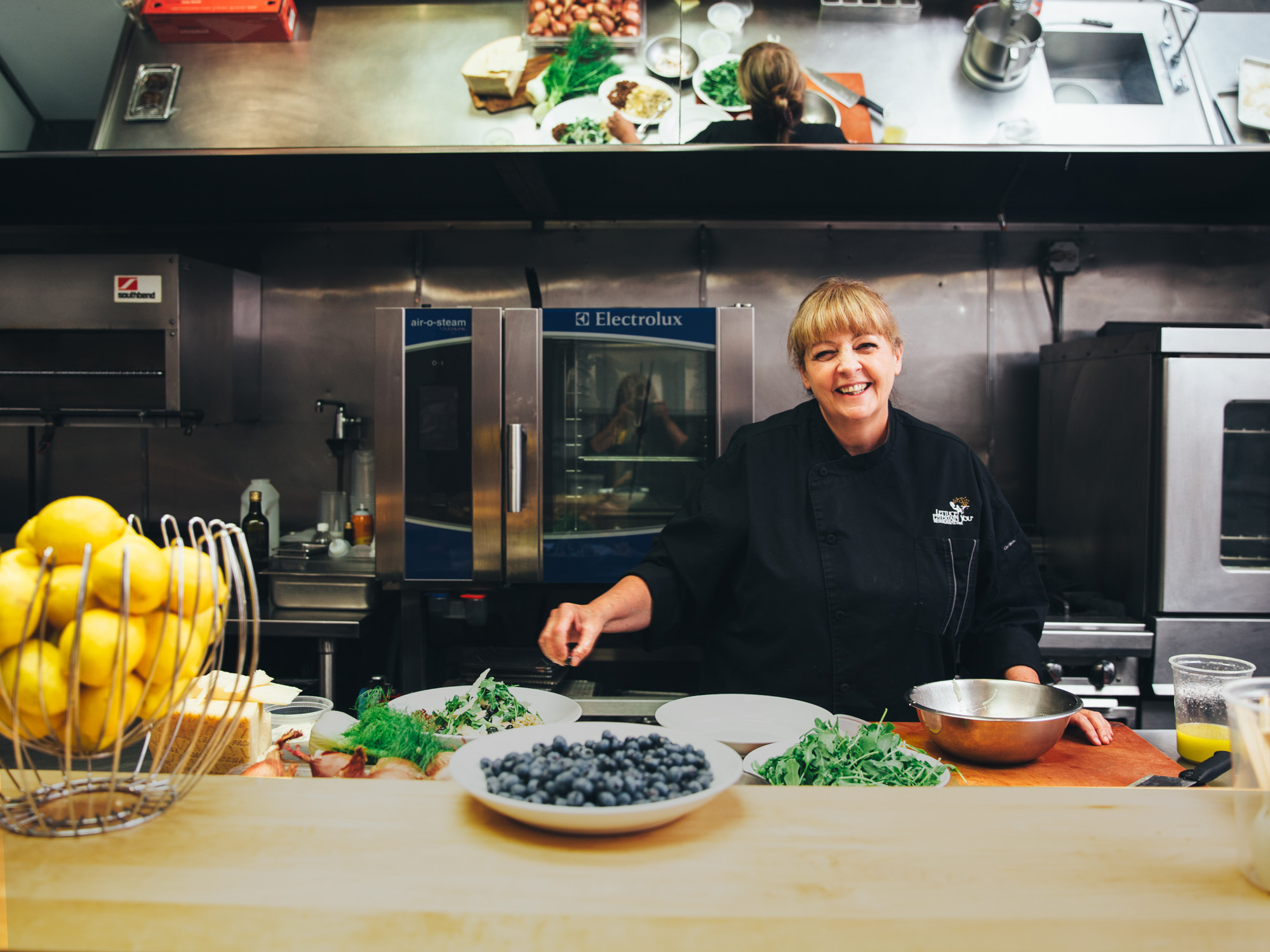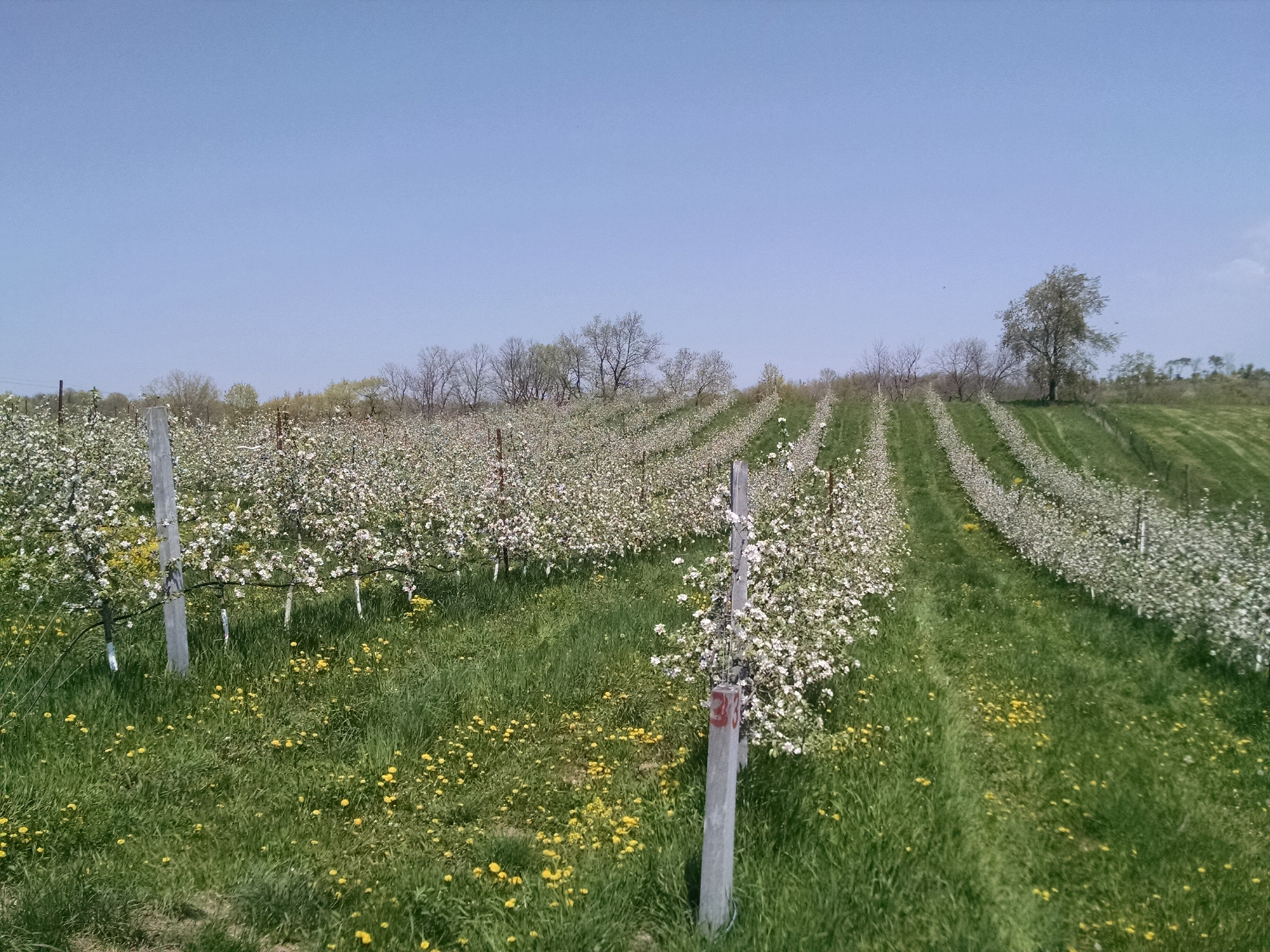GOD MADE A FARMER, A TV COMMERCIAL told us, but Her track record at making successful ones is a lot better when they have support, like training or mentoring in specific aspects of the job. There is a wide variety of programs and alliances offering that kind of support in Illinois and the upper midwest, and Routes to Farm is a new umbrella organization, led by Angelic Organics in Caledonia, Illinois, which brings 13 of these groups together in a more comprehensive network of services. Or as James Pirovano of FamilyFarmed, the newest group to join the alliance, puts it, “one-stop shopping for family farmers.”

This story was developed in partnership with the Good Food Festival, March 16-18 at UIC Forum, GoodFoodFestivals.com. Editorial is the sole production of Fooditor.
Okay, cool, you say, but you’re not a farmer, so where do you fit into this? Well, connecting the world of farmers with Chicago customers who want to know more about the food they eat is what the Good Food Festival is about every year. FamilyFarmed puts on the three days of seminars and discussions for aspiring growers as well as the Saturday market session open to the public. And as part of this year’s festival, March 16 through 18, Routes to Farm will give an award for Beginning Farmer of the Year at the Friday opening session, which includes a $1000 honorarium.
So who does become a farmer these days? Well, the best way to answer that is to talk to the five nominees for 2017 Beginning Farmer of the Year—and to watch the videos that were submitted by the member organizations of Routes to Farm who nominated them. (Beginning, in this case, is defined as less than 10 years of farming.) You’ll see not only who chooses this life, of being more connected to our food system (and thus helping us all be better connected to it if we choose), but the wide diversity of ways in which people choose to pursue that connection in the upper midwest. Here are five who chose to become farmers; maybe you’ll see one of them at a farmers market, or name-checked on a menu, near you soon.
Sugar Grove Farms
[su_youtube url=”http://www.youtube.com/watch?v=GD9eMeGN-2s” width=”700″]
Chase Sanert entered the world of artisanal meat and farmers markets like many do—as a way to make viable a farm that no longer worked economically. His family has owned 150 acres about 20 miles north of Springfield for 73 years. For his parents, Ron and Sue, the farm was a side venture to their auctioneering business—”Cattle are the cheapest form of therapy,” Ron likes to say.
But it wasn’t well-suited to making money in industrialized commodity farming, which in central Illinois means corn and soybeans. “My idea was that the thing that would make agriculture sustainable here would be quality over quantity,” Chase says. So in 2013 he and his wife Megan decided to use it for livestock grazing, growing grass and perennial crops and using no-till farming methods. “The cattle graze, the hogs are outdoors, the chickens are on pasture,” he says. “For us it was the only option, the only way to make this farm go, but also the only way we wanted to do it.”
That meant he had to find his own markets for his livestock. “Being a family farm trying to move into a new era of productivity and sustainability, I didn’t know who our allies were,” Chase says. Connecting with the Illinois Stewardship Alliance, a member of Routes to Farm (and the organization that nominated Sugar Grove Farms), helped them find markets. “There are people who want your product out there,” he says. “They brought us together with the people looking for us.”
Ultimately that meant not just farmers markets in the area, but he recently gained the farm’s first account in Chicago—Publican Quality Meats. He hopes that winning Beginning Farmer of the Year will help him make more inroads into the Chicago restaurant market. “We’re quality driven. We live and die to produce the best meat we can,” he says.
Wishful Acres Farm and Brewery
[su_youtube url=”http://www.youtube.com/watch?v=MKR3TL1OuAk” width=”700″]
Penny and Nate Peterson may have found the recipe for happiness as family farmers, at least when one loves to grow things and the other is a home brewer: they started a farm and a brewpub on their land in Lena, near Freeport in the northwest corner of Illinois.
Penny started the farm business about 8 years ago as something to do as a stay-at-home mom. Today she grows over 100 different crops on three acres, initially selling at farmers markets and now to about 30 CSA members—”I do it all myself, finding customers mostly though word of mouth,” she says. Along the way she drew on her area’s farmer support organization, Upper Midwest CRAFT, as a resource—”I’ve taken every advantage of every program CRAFT offered.”
One of the key lessons for her was that you get out of just being a commodity farm with value-added products—which can be anything from products like jam to experiences on the farm, an attitude fortunately shared by the Farm Service Agency of the USDA. So she pursued an FSA loan to add a commercial kitchen to the farm. That was an unusual request and, she says, it took FSA an extra couple of months to decide if they could even do it legally. But in the end, based on the years she’d already spent working as a farmer, they made the loan and once it was built, she says, “Our area FSA office was pretty excited—they came out and took pictures of it.”
Next they spent a year building the brewpub, which opened last fall. It uses hops, pumpkins and other produce from the farm, but more than that it’s brought new traffic to the farm and the area in general—”In just the first three months it was open, it blew away the farm. We’re on track to triple projections for the farm, based on how the brewery is doing,” she says. As for the prospect of winning Beginning Farmer of the Year, she says, “The exposure is fun. We’re way out here in the middle of nowhere, we don’t get a lot of interaction with other farmers.”
CHJ Umoja Family Gardens
[su_youtube url=”http://www.youtube.com/watch?v=Yt2LV0geHMA” width=”700″]
Janet Zintambila first came to the midwest from her native Kenya in 1979 to study Special Education at Iowa Wesleyan, and then to get a Master’s at Western Illinois University in the Chicago suburbs. But she always maintained gardening as a hobby, and about seven years ago she started growing produce on a two-acre plot near Normal, Illinois, to serve the African population, mostly Congolese, in that area. The hobby quickly became a business, named for a Kenyan word that means “unity,” and today she grows a wide range of starches and greens, including three varieties of sweet potatoes, onions, tomatoes, rapini, collards, kale, and turnips. All organically—she was nominated for the award by the Illinois Organic Growers Association.
Most interesting are the things she grows for Africans that are unfamiliar to most white Illinoisans. First, there’s white maize, rare in a yellow corn-growing state, though no stranger to the Mexican population, or to others like Filipinos. Africans eat it roasted like Americans eat yellow corn, but they also grind it into flour, where it’s used to make dishes like fufu. “We like it firmer than Americans eat yellow corn, a little chewy like a dried pea,” she says. White maize is her primary crop, and another is amaranth, a grain with many health benefits.
Then there are things like sweet potato leaves—”Very nutritious, they’re eaten in Africa, the Philipines, Asia, and I believe Jamaica,” she says, and African nightshades (“Very high in anti-oxidants”). She sells to a wide range of markets in the Bloomington-Normal area, including local supermarkets such as Hy-Vee, and for a time sold to Farmer Tom’s CSA in the Chicago area (“But I am the only one, it wore me out”).
Beyond growing for the African community, she sees her mission as educating people about African food—”I’m always thinking, how can we highlight African food, get people acquainted with our African foods,” she says. “Food is so versatile, it creates a conversation. Let’s talk more about each other’s food, and learn about African food.”
One way she does that is by hosting people to work a day on her farm during harvest. “There’s so much enthusiasm—I always hear ‘Oh, I haven’t done this in years, it reminds me of mom, it reminds me of home.’ Those kinds of stories.” Well, and sometimes it’s the start of new stories—one couple who met on a day at her farm will be getting married this June.
Bryant Family Farms
[su_youtube url=”http://www.youtube.com/watch?v=D5nWQ6imfS0″ width=”700″]
Nicholas Bryant considers himself the very model of a beginning farmer. “Say you’re 24 and you grew up on a farm, you may be beginning by buying into the family farm after college, but you have 10, 15 years of experience on your family’s farm before that,” he says. “I’m truly a beginner.”
Bryant grew up in Evanston; he went into the Air Force and after leaving it with service-connected disabilities in 2002, he worked in landscaping and in IT for the Evanston-Skokie school district, then for the Pecatonica school district west of Chicago near the Wisconsin border. Along the way he began helping out more and more on farms of relatives and family friends, eventually working as a caretaker on a dairy farm near Dodgeville, Wisconsin. “I got some knowledge and experience—but there’s still a big difference between that and 1000 chickens,” he says.
4-1/2 years ago he took the plunge. With $75 and some used feeders and spent Amish hens, he started naturally raising pasture poultry in Hollandale, Wisconsin, and selling eggs and chicken at farmers markets in Middleton, Janesville, on Monroe Street in Madison, and in Chicago. Last year he got an FSA loan which enabled him to buy another piece of land in Mineral Point; besides chickens, he raises ducks, heritage turkeys, pigs, goats, rabbits and even a few steers. (He was nominated for the award by Southwest Badger RC&D, which helped him find the property.)
“I don’t raise product to raise product, I raise product because I eat the product,” he says. “It’s been me and me only. It’s a great opportunity for me. If you want to be a farmer, nobody says you have to start with 100 acres. Sell your house, buy 5 acres, and start small.”
B.S.R.R. Youth Center & Academy/Farm
[su_youtube url=”http://www.youtube.com/watch?v=v__vlvOWZgY” width=”700″]
There’s some sharp irony behind Pembroke Township selling itself as a potential organic food region today—the primarily African-American area near the Indiana border in Kankakee County has long been too poor to be farmed industrially. Today Pembroke Farming Family hopes to break that cycle by fostering artisanal farming among the young people in this area plagued by chronic unemployment—but also still possessing a tradition of growing your own food.
And you can’t get much younger people than the ones being taught the basics of farming by B.S.R.R. Youth Center & Academy/Farm—as young as 3 years old. Irene Seals started the program on her horse farm several years ago, and after she passed in 2013, it has been carried on by her daughter Diane McDonald.
The kids in the program—neighbors, kids McDonald provides day care for, and anybody who takes an interest and wants to play with dirt—do it all, McDonald says: “We start the seedlings inside, transfer them to the greenhouse after a month, and the kids do everything from planting the seeds to weeding, harvesting, and taking it to market.” They sell produce at south side farmers markets including the Seaway Bank market on 87th, South Shore Trinity Lutheran, and in suburban Momence. In the winter, when nothing grows, she teaches them other ways to make things that can be sold at local markets, like jewelry.
McDonald is now trying to work with local schools to offer a version of the program to students—though she says the school district is more interested in poultry farming, so she needs to grow the hens and eggs side of the farm. For McDonald, the purpose of her program is “to give the kids an appreciation of the land, and to spread the entrepreneurship of owning land. It’s a rural area—everybody has some land and can grow some food, and feed themselves.” And to put her land where her principles are, she’s given her own kids, who range from ages 4 to 12, a half acre plot to manage themselves. It’s their third season of planting and they’re planning to grow corn, beans, tomatoes, okra, squash and herbs.
Michael Gebert plows fertile fields as editor of Fooditor.
Cover image: courtesy of Wishful Acres Farm and Brewery
Latest
Join the Discussion
After you comment, click Post. If you're not already logged in you will be asked to log in or register with Disqus.







